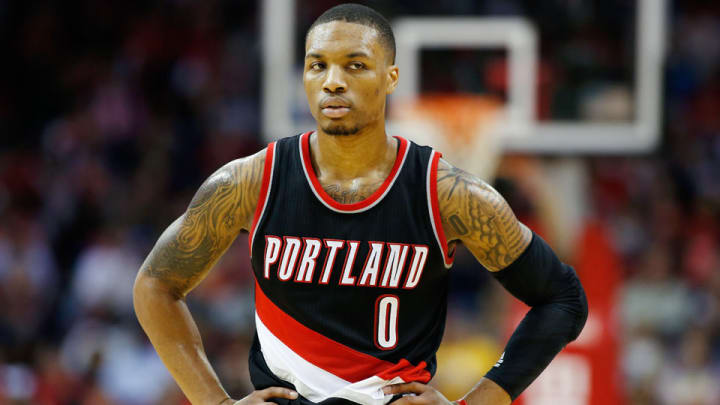Damian Lillard's belated All-Star berth reminds us the importance of snubs

With a flick of his pen, NBA commissioner Adam Silver righted what so many felt was wrong. Damian Lillard is now an All-Star. It took two injury replacements to make that so, but ultimately Lillard's career credentials will read more or less the same as if he had been selected outright.
This is where much of the outrage ends. For this All-Star season, Lillard was the definitive snub. He wrote a since-deleted Instagram letter that led with his thanking all the coaches who "[felt he] wasn't good enough." He told reporters of feeling disrespected. He straight-up soliloquized in a pointed spot for Adidas. Lillard wore his snub on his sleeve and his legions of fans responded in and at high volume.
They (and Lillard) had a point, of course. Lillard is a worthy All-Star. So, too, are the seven reserves chosen by the NBA's coaches and DeMarcus Cousins, who was tabbed as the West's first injury replacement. But with Cousins and Lillard now accounted for, the Western Conference All-Star team has reached something of a threshold: a line at which discussion of the team's snubs has faded almost completely. This is now something resembling a consensus All-Star team.
That it took 14 All-Star spots to reach that point has triggered discussion of expanding the size of the roster at even the highest levels. This became especially apparent when Silver was tasked to replace the injured Kobe Bryant with one of Cousins or Lillard. He chose Cousins, but spoke to the difficulty of the decision and a possible way around such dilemmas in the future.
"From his standpoint, [Lillard] did everything that was necessary," Silver said last week, per the Associated Press. "So maybe we have to find a way to expand the slots we have for the All-Star team."
• MORE NBA: Blazers at No. 9 in latest NBA Power Rankings
It's easy to understand where Silver is coming from when he broaches the possibility. Lillard has been one of the best guards in the league this season, plays for one of the West's best teams, and even drew some early MVP chatter. For him to miss the All-Star cut is a signal. A signal of what is debatable; where Silver sees cause to consider expanding the limits of the All-Star roster, others might find evidence only of the West's uniquely dense field of deserving players.
SI.com's 2015 NBA All-Star coverage
Backgrounded – and perhaps forgotten – in these discussions is the fact that selecting the All-Star team is supposed to be difficult. It is an honor in its exclusivity. The more the roster is expanded, the less rewarding All-Star selection becomes. Setting the roster size to 13 or 14 would accommodate Lillard and those like him. At the same time, it would only redefine All-Star standards to ensure that some other player would go snubbed. If not Lillard then Zach Randolph, Mike Conley, Gordon Hayward, Tyson Chandler ... there is no shortage of talent. There is only some reasonable definition of what we expect an All-Star to be and the challenging process of finding those who best qualify.
• MORE NBA: How Lillard can avoid ever being a snub again
A system that initially couldn't find room for Lillard isn't a broken one. It's doing just as intended with a field that necessitated difficult omission. If not for those, what purpose would the All-Star game serve? A snub is not an indictment so much as a point of demarcation. It is a statement in itself on the quality of those chosen that Lillard – or Cousins or Randolph – were not.
Sometimes an injury comes along to placate some "disrespected" player and the ranks of fans who advocate on their behalf. This makes for a tidy, situational resolution. But to broaden the concept further by expanding the All-Star roster's limits would reduce the selection process to an exercise in appeasement. If that's the intent (perhaps in conjunction with the tilt of the All-Star game as pure spectacle), then the league can do as it will to widen the roster. For selection to mean anything at all (as has been the case in weighing Hall of Fame merits and the like), however, requires a more restrictive boundary.
